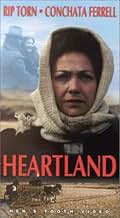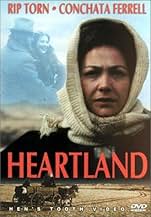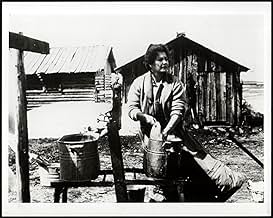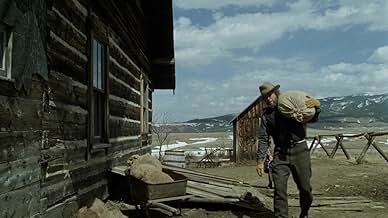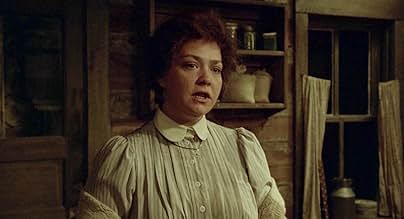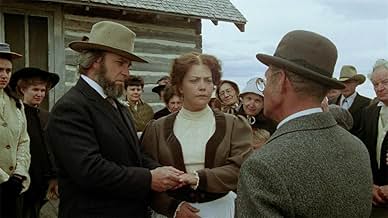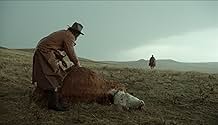CALIFICACIÓN DE IMDb
7.2/10
1.4 k
TU CALIFICACIÓN
Una viuda con una hija pequeña viaja a un rancho en Wyoming para administrar la casa de un ranchero. Después de un tiempo, el hombre y la mujer desarrollan una relación que lleva a un matrim... Leer todoUna viuda con una hija pequeña viaja a un rancho en Wyoming para administrar la casa de un ranchero. Después de un tiempo, el hombre y la mujer desarrollan una relación que lleva a un matrimonio. Pero la vida en el duro lugar pasa factura.Una viuda con una hija pequeña viaja a un rancho en Wyoming para administrar la casa de un ranchero. Después de un tiempo, el hombre y la mujer desarrollan una relación que lleva a un matrimonio. Pero la vida en el duro lugar pasa factura.
- Dirección
- Guionistas
- Elenco
- Premios
- 4 premios ganados en total
- Dirección
- Guionistas
- Todo el elenco y el equipo
- Producción, taquilla y más en IMDbPro
Opiniones destacadas
10hbfreeb
This is one of the best films ever made. It is a realistic depiction of rural ranching life which was a big part of American History. The setting is 1906 Wyoming where life had not changed much since the previous century. The film keeps your interest without the added Hollywood myths. The whole family can see this movie and be intrigued about how life was like in America when it was mostly a rural nation. With this film, you will escape the present and witness the daily life of 100 years ago. In a beautiful, scenic environment you will see the hard physical work that was required to survive, as well as the constant worries and concerns of the elements and the market pressures that will make a difference between success or failure. See this movie and experience life as it was for most of our nation's history. This film is worth your time to see. My only question is - why aren't there more films like this one?
I saw Heartland when it was first released in 1980 and I have just seen it again. It improves with age. Heartland is not just for lovers of "indie" films. At a time when most American films are little more than cynical attempts to make money with CGI, pyrotechnics, and/or vulgarity, Heartland holds up as a slice of American history. It is also a reminder of how spoiled most of us modern, urbanized Americans are.
Nothing in this film is overstated or stagey. No one declaims any Hollywood movie speeches. The actors really inhabit their roles. This really feels like a "small" film but really it is bigger than most multizillion-dollar Hollywood productions.
The film is based on the lives of real people. In 1910, Elinore Randall (Conchata Ferrell, who has never done anything better than this), a widow with a 7-year-old daughter Jerrine (Megan Folsom), is living in Denver but wants more opportunities. She advertises for a position as housekeeper. The ad is answered by Clyde Stewart (Rip Torn, one of our most under-appreciated actors), a Scots-born rancher, himself a widower, with a homestead outside of Burnt Fork, Wyoming. Elinore accepts the position (seven dollars a week!) and moves up to Wyoming with her daughter. She and her daughter move into Stewart's tiny house on the property. It is rolling, treeless rangeland, a place of endless vistas where the silence is broken only by the sounds made by these people and their animals. It's guaranteed to make a person feel small. The three characters go for long periods without seeing another human soul. What is worse, Stewart turns out to be taciturn to the point of being almost silent. "I can't talk to the man," Elinore complains to Grandma Landauer. "You'd better learn before winter," replies Grandma. Grandma (Lilia Skala) is one of the only two other characters who are seen more than fleetingly. She came out to Wyoming from Germany with her husband many years before and runs her ranch alone now that she is also widowed. Grandma is their nearest neighbor (and the local midwife) and still she lives ten miles away! The other supporting character is Jack the hired hand (Barry Primus).
Elinore's routine (and her employer's) is one of endless, backbreaking labor, where there are no modern conveniences and where everything must be made, fixed or done by hand. This is the real meat of the film: Watching the ordinary life of these ranchers as they struggle against nature to wrest a living from the land. But despite the constant toil and fatigue, Elinore is always looking for other opportunities. She learns that the tract adjacent to Stewart's is unclaimed. Impulsively, she files a claim on the property (twelve dollars, or almost two weeks' pay!), meaning that if she lives on it (and she must actually live there) and works it for ten years, she will get the deed to it. Naturally, Stewart learns what she has done. With merciless logic, he points out that with no money, no livestock, no credit, and no assets, she has no chance of succeeding. He then offers a solution: He proposes marriage. The stunned Elinore realizes that this is the only real alternative, and accepts.
We think that Stewart's proposal is purely Machiavellian---he wants the land and the free labor---but we see that, in fact, he is genuinely fond of Elinore, and they grow together as a couple. She becomes pregnant; she goes into labor in the middle of a midwinter blizzard; Clyde travels for hours on horseback through the storm the ten miles to Grandma's and the ten miles back, only to announce that Grandma wasn't there. This is more like real life than is pleasant, folks. Elinore has the baby all by herself, with no help whatsoever. Their son is still an infant when he gets sick and dies. They lose half their livestock to the vicious winter. They struggle on. The last sequence in the film is supposed to be optimistic: The birth of a calf. Clyde calls Elinore urgently to help him deliver the calf. Instead of being head first, the calf is in a footling breech presentation. He and Elinore must physically pull the calf out of the birth canal. There is no CGI, animatronics, trickery, fakery or special effects: What you see is what happened, folks: A calf is born on a bed of straw in a wooden barn by lamplight. With that, the film does not so much end as simply stop, leaving the viewer unsatisfied, but after a while you appreciate the film as a whole, not just for its ending.
This little gem rewards patience and thoughtfulness. It will be watchable long after most of the films of the last generation have long been forgotten.
Nothing in this film is overstated or stagey. No one declaims any Hollywood movie speeches. The actors really inhabit their roles. This really feels like a "small" film but really it is bigger than most multizillion-dollar Hollywood productions.
The film is based on the lives of real people. In 1910, Elinore Randall (Conchata Ferrell, who has never done anything better than this), a widow with a 7-year-old daughter Jerrine (Megan Folsom), is living in Denver but wants more opportunities. She advertises for a position as housekeeper. The ad is answered by Clyde Stewart (Rip Torn, one of our most under-appreciated actors), a Scots-born rancher, himself a widower, with a homestead outside of Burnt Fork, Wyoming. Elinore accepts the position (seven dollars a week!) and moves up to Wyoming with her daughter. She and her daughter move into Stewart's tiny house on the property. It is rolling, treeless rangeland, a place of endless vistas where the silence is broken only by the sounds made by these people and their animals. It's guaranteed to make a person feel small. The three characters go for long periods without seeing another human soul. What is worse, Stewart turns out to be taciturn to the point of being almost silent. "I can't talk to the man," Elinore complains to Grandma Landauer. "You'd better learn before winter," replies Grandma. Grandma (Lilia Skala) is one of the only two other characters who are seen more than fleetingly. She came out to Wyoming from Germany with her husband many years before and runs her ranch alone now that she is also widowed. Grandma is their nearest neighbor (and the local midwife) and still she lives ten miles away! The other supporting character is Jack the hired hand (Barry Primus).
Elinore's routine (and her employer's) is one of endless, backbreaking labor, where there are no modern conveniences and where everything must be made, fixed or done by hand. This is the real meat of the film: Watching the ordinary life of these ranchers as they struggle against nature to wrest a living from the land. But despite the constant toil and fatigue, Elinore is always looking for other opportunities. She learns that the tract adjacent to Stewart's is unclaimed. Impulsively, she files a claim on the property (twelve dollars, or almost two weeks' pay!), meaning that if she lives on it (and she must actually live there) and works it for ten years, she will get the deed to it. Naturally, Stewart learns what she has done. With merciless logic, he points out that with no money, no livestock, no credit, and no assets, she has no chance of succeeding. He then offers a solution: He proposes marriage. The stunned Elinore realizes that this is the only real alternative, and accepts.
We think that Stewart's proposal is purely Machiavellian---he wants the land and the free labor---but we see that, in fact, he is genuinely fond of Elinore, and they grow together as a couple. She becomes pregnant; she goes into labor in the middle of a midwinter blizzard; Clyde travels for hours on horseback through the storm the ten miles to Grandma's and the ten miles back, only to announce that Grandma wasn't there. This is more like real life than is pleasant, folks. Elinore has the baby all by herself, with no help whatsoever. Their son is still an infant when he gets sick and dies. They lose half their livestock to the vicious winter. They struggle on. The last sequence in the film is supposed to be optimistic: The birth of a calf. Clyde calls Elinore urgently to help him deliver the calf. Instead of being head first, the calf is in a footling breech presentation. He and Elinore must physically pull the calf out of the birth canal. There is no CGI, animatronics, trickery, fakery or special effects: What you see is what happened, folks: A calf is born on a bed of straw in a wooden barn by lamplight. With that, the film does not so much end as simply stop, leaving the viewer unsatisfied, but after a while you appreciate the film as a whole, not just for its ending.
This little gem rewards patience and thoughtfulness. It will be watchable long after most of the films of the last generation have long been forgotten.
This is a first-rate film, based on the letters of its heroine, Elinore Pruitt Stewart (and published in the book Letters of a Woman Homesteader, in print 2003), supplemented with material gathered from other frontier families. The film follows the life of a widow with a young daughter who arrives in Wyoming (in actual life, Colorado) in 1910 to serve as housekeeper for a rancher. The film is inconclusive, as it should be: this isn't a story so much as a slice of life. And what a life! Regardless of whether the character represents Elinore's true nature, this is a wonderful woman: strong, self-determining, and courageous. She's not your usual impossibly slender, pretty young thing--Hollywood seems to think mere wisps could survive these hardships and keep their Mary Kay contact visiting regularly--but a sturdy and practical woman who never flinches at what life throws at her. One scene to watch for (among many): taking down clothes from the clothesline. I won't give the game away, but Elinore Stewart was one hell of a human being. I'd have felt honored to know her.
Heartland was in production about the same time as Michael Cimino's Heaven's Gate - Heartland cost a fraction to make but is 10 times the piece of film.
Heaven's Gate was "the biggest and most expensive ($40 mil in 1980!) Hollywood flops of all time, its failure resulted in the sale of the United Artists studio to MGM" -imdb entry
Heartland cost a few hundred thousand dollars and benefits from great writing, direction, photography and acting. It easily draws you into the beauty, joys, hardships and sorrow of pioneer life.
It's sad that Hollywood sometimes would pour millions into turkeys (based on a director's single big hit) and neglect such a wonderful story.
Heaven's Gate was "the biggest and most expensive ($40 mil in 1980!) Hollywood flops of all time, its failure resulted in the sale of the United Artists studio to MGM" -imdb entry
Heartland cost a few hundred thousand dollars and benefits from great writing, direction, photography and acting. It easily draws you into the beauty, joys, hardships and sorrow of pioneer life.
It's sad that Hollywood sometimes would pour millions into turkeys (based on a director's single big hit) and neglect such a wonderful story.
Portrays the day to day stark reality of survival on a ranch in the old west. Outstanding acting by both principal actors. This doesn't even feel like a movie...you feel like you're there. Animal activists should beware...many scenes are obviously not just realistic...they are real.
¿Sabías que…?
- TriviaLetters written by Elinore Pruitt Stewart (aka Elinore Stewart) provided the basis for the film. These letters dated from April 1909 to November 1913 and were first printed in "The Atlantic Monthly".
- ErroresThe story is set in 1910. When Elinore and Jerrine are riding across the prairie, they are singing the hymn "In The Garden" which was published in 1912, according to Wiki.
- ConexionesFeatured in Sneak Previews: Independent Films (1981)
Selecciones populares
Inicia sesión para calificar y agrega a la lista de videos para obtener recomendaciones personalizadas
- How long is Heartland?Con tecnología de Alexa
Detalles
Taquilla
- Presupuesto
- USD 600,000 (estimado)
Contribuir a esta página
Sugiere una edición o agrega el contenido que falta

Principales brechas de datos
By what name was Heartland (1979) officially released in Canada in English?
Responda

